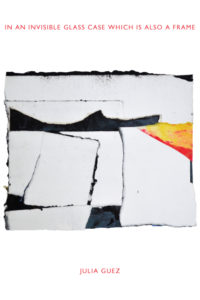Framing And Unframing Until We Get It Right
by Susan Moore | Contributing Writer

In an Invisible Glass Case Which Is Also a Frame
Julia Guez
Four Way Books, 2019
Julia Guez’s debut collection, In An Invisible Glass Case Which is Also a Frame, presents and plays with shifting frames, viewpoints, and influences. The book contains self portraits, still lifes, epithalamiums, an idyll, and a nocturne. These various forms, plus plenty more of her own invention, work together as an extended invitation to the reader to consider how we organize the world, if it’s possible to make it cohere, and if it’s even necessary that it does.
What’s inside these various frames? Gentrification, income inequality, immigration, the opioid epidemic, philosophy, myth, and our relationship to the body. Guez fills her poems with carefully selected and often startling images, drawing as much from contemporary life as historical viewpoints. The way she juxtaposes the images is often startling but never random, as in “Still Life With A Vicodin”:
We may as well sing, George.
Inside the throat,
a carriage, a pony, a parachute.
In another poem, “Still Life In Another Neighborhood We Can’t Afford,” Guez points to
Grass painted green. Living rooms full
of Lucian Freud. No sequins in the window
on the corner, only a few flags—
“Still life” is usually used to title a grouping of inanimate objects, but Guez’s still lifes are active places. “Still Life With Particularly Dressing Circumstances,” filled with italicized quotes from a New Yorker article on deportation:
All that work and for what. His body began to feel
as if it were entirely liquid. His limbs felt soft and porous.
All he wanted to do was close his eye.One convalescene after another, a kind of willed dying.
The poem “The World, According to Whitehead” refers to the philosopher Alfred Whitehead, the mathematician and philosopher who was best-known for his writings in what became known as Process philosophy. The Internet Encyclopedia of Philosophy explains Process Philosophy as “characterized by an attempt to reconcile the diverse intuitions found in human experience (such as religious, scientific, and aesthetic) into a coherent holistic scheme.” Guez adapts this definition in the following way:
the world, according
to Whitehead, is stillmore than amenable
to manifold interpretations
my own no less validbecause it’s fanciful,
although I’ve also considered the facts.
It’s hard not to see the word “facts” at this cultural moment and think of “fake news” and all the associations that come along with it. If we use our imaginations, is there still validity? This nod to “manifold interpretations” is also echoed in “Epithalamium II” where she writes
Also, . . .
illusion (one may or may not recognize as such until more and more through
attempts to reconcile version of the same story show themselves to be
irreconcilable at long last, calling the whole process into question).
“Calling the whole process into question” could easily serve as a secondary title to this collection, as part of what Guez seems to wrestle with is how to create something out of all the messy elements that make up a life. Given the chaos and competing demands of contemporary life, she reminds us that it might not be possible to reconcile all the different versions.
Silence plays a role in this book, too. There’s plenty of white space between lines, and the idea that language can often fail and can only take us so far. is alluded to more than once. In “Myth, Then” she writes
Home is a question of this and that frequency then
something akin to silence—a word for which my lexicon can’t supply a cognate . . .
and in “Epilogue”:
coming now to the place where no word is apt, parting
These nods to language’s limits prepares the reader for the final poem, which is a simply a title, “Concerning this new fear something else will befall you—which of course it will—and what then.” “What then” as the last two words of the collection, given all the poems that precede it, seems to be a handing off of the baton to the reader. What comes next, reader, after the next disaster? You tell me.
—
Susan Moore is the winner of the 2019 Juniper Prize in Poetry and her first full-length collection, That Place Where You Opened Your Hands, will be published by University of Massachusetts Press in April 2020. She lives in Portland.
